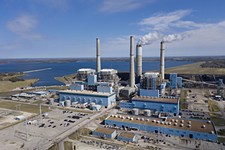Point Austin: Return on Investment
Austin Energy rate cuts are both a financial and political dividend
By Michael King, Fri., Sept. 2, 2016

To what do we owe our Austin Energy bounty?
On Monday, City Council gave its final approval to a settlement agreement that will result in a total of $42.5 million in rate reductions (beginning Jan. 1, 2017) to all customer classes. Most of that windfall – $37.5 million – will go to industrial and commercial customers, who use the most energy. But $5 million will be divvied up among us commoners – meaning anywhere from four to 70 bucks in annual reductions. Council's final debate and decision was to determine how best to distribute that kitty in a rational and equitable way among the five existing "tiers" (levels of energy usage). ("Austin Energy: Rate Cuts Solve Everybody's Problems.")
At any level, it's not an enormous return to residents, but it does serve as a lagniappe to Austinites who have grown accustomed to rising costs. Moreover, it comes with a public knowledge bonus that wouldn't have been possible if AE hadn't been required to review and present its numbers to the public. Speaking this week of the "cost of service" study AE commissioned earlier this year, Mayor Steve Adler said, "You won't find a city, or a municipal utility, that did just what we did. It made everybody see the numbers, and it put everybody in a room, to answer the question, 'What is really the fair way to divide the rates?'" (For the record, after 18 years of Council's treating the utility's rates like a subway's third rail, the pre-10-1, 2012 Council directed a rate review – including both an impartial hearing examiner and independent consumer advocate – every five years.)
It's no secret that Austin's publicly-owned utility operates in shadow of a skeptical Public Utility Commission and a hostile Texas Legislature, encouraging both suburban ratepayers and major industrial consumers to brandish those hammers when they're feeling pinched. With AE's finances having improved since the last rate case, Adler believes the backlash had potential consequences. "I think it was reaching a point last year," said the mayor, "when confidence in the institution was being challenged."
Money to Burn
Yet another important factor is the steady decline in energy costs – natural gas and renewables – over the last several years. I asked longtime clean energy activist Tom Smith of Public Citizen if he thought a $42.5 million hit would affect AE's bottom line sufficiently to undermine its role in funding the city's other expenses (utility transfers currently represent about 16% of General Fund revenues). Smith dismissed the concern, saying that initial proposals from stakeholders were suggesting cuts of $70 million or more. Smith agreed with the mayor that there had been no real interest in taking the argument to the Capitol. "Nobody wanted to go to the PUC or Legislature," he said. "They'd rather deal with the Austin City Council than spend hundreds of thousands on an appeal [to the PUC] and more on the Legislature in lobbying."
In the end, Smith concluded, it was a "win-win-win" for everybody, including the environmental advocates who insisted on building assurances into the agreement that the retirement of the coal-burning Fayette Power Project would move forward as planned.
Our Own Business
In the course of the public discussion, we also learned that "low energy users" and "low-income users" are not necessarily the same people. Indeed it turns out that those "Tier 1" residential customers, who use the least amount of energy, are more often residents of small, energy-efficient apartments or condos – the mayor cited himself as an example – than poor folks cutting back on August air-conditioning. In fact, most of us range across Tiers 2-4, and Council accordingly spread most of the cuts across those tiers while still redirecting a reduction to Tier 1, while removing most of the reduction for the highest users.
Nevertheless, it was a highly symbolic change, as council members acknowledged from the dais that leaving a slight rate increase to Tier 1 (as initially recommended), while everybody else got a cut, would leave many people with the perception that the poorest had once again gotten the shaft. So "everybody gets a little," said Smith, with the additional consideration that there ought to be some small bonus for conservation.
To return to where we began: To what do we owe our Austin Energy bounty? Largely to the fact that we all own our electric utility communally, and that public ownership enables us to debate all these issues in a democratic fashion rather than leaving the matter to ownership behind closed doors. Moreover, added Mayor Adler, "Everybody in this process conceded that the citizens of Austin, as the shareholders in the company, were entitled to take a return. The debate focused on what you would want it to focus on: What is the appropriate level of revenue, and what is the appropriate way you would want to divide that revenue?"
That's something to recall the next time you hear a candidate or a special-interest group demanding the privatization of our public utility, with the corollary to "run it like a business." It's our business, and it's our business how we run it.
Got something to say on the subject? Send a letter to the editor.










